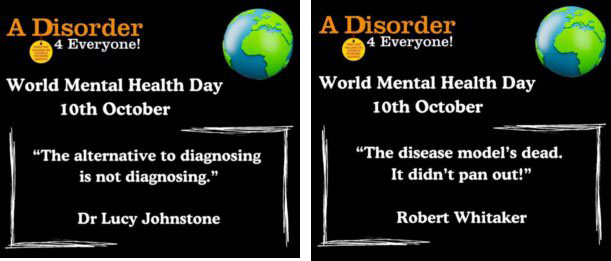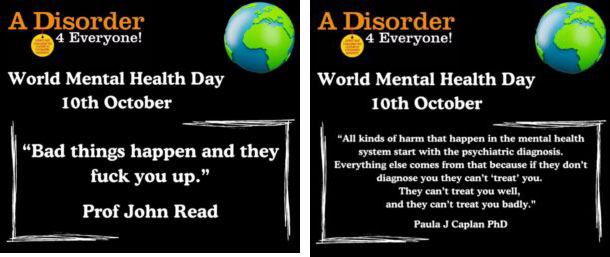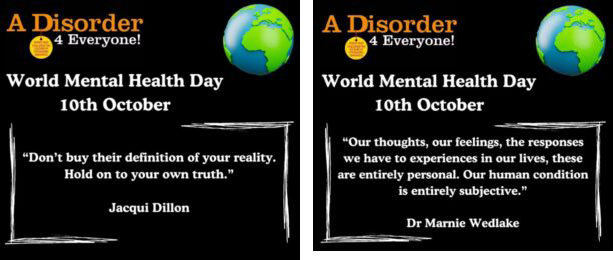Editor’s Note: This article originally appeared on our affiliate site, Mad in the UK. It was written by Jo Watson, psychotherapist and founder of Drop the Disorder! and A Disorder 4 Everyone (AD4E).
Eight years ago, on World Mental Health Day 2017, I wrote a piece for Mad in America called World Mental Health Day – Challenging the Messages – A Call to Action
Back then, I wrote about the sense of exhaustion and defeat that many of us felt in the lead up to World Mental Health Day. (A day that is essentially a gaslighting exercise for the mental health industry and a marketing opportunity for psychiatry and big pharma.)

We knew the wave of disease-model propaganda was coming, and we braced ourselves for it. But that year it felt especially raw. Our friend and ally Matt Stevenson had died only weeks before, after years of struggling with the weight of the psychiatric labels he had had imposed upon him.
https://www.madinamerica.com/2017/09/in-memoriam-matt-stevenson/
Matt’s death stripped away any ability to quietly tolerate the toxic messages pushed out every October.
That was the year I decided we would not just sit back and watch. With others in the Drop the Disorder Facebook group and the AD4E community, we set out to flood social media with alternative messages, challenging the lies at the heart of the biomedical story. We created and shared quotes, invited all voices in, and used the WMHD hashtags to disrupt the smooth surface of the official campaign. It wasn’t about thinking we could overpower the mainstream. It was about showing up, being visible, creating cracks in a narrative that harms people.

Almost a decade on, I hoped that by now things might look different.
They don’t. Not in the ways that matter. The same biomedical story still dominates. The same industries still profit. And the same tired messages are rolled out every October under the banner of “awareness.”
World Mental Health Day was created in 1992 by the World Federation for Mental Health. From the mid 1990s onwards, the day became a perfect platform for pharmaceutical companies to promote the idea of “mental disorders” as brain diseases that need to be medicated with psychiatric drugs. It is no surprise that Big Pharma has quietly sponsored WMHD campaigns, fuelling the chemical imbalance myth and shaping global mental health policy in ways that still influence everything today. (See references to reports below if you doubt this is true!)
So when we see governments, corporations and charities posting their colourful logos every October, let’s remember who benefits from that story. Because it definitely isn’t the people who are struggling.
But what has changed since that 2017 blog is us. The collective voice that refuses to collude has grown louder and more connected. Many more critical individuals, groups and organisations are demanding to be heard.
As for AD4E, since 2017 there have been three Drop the Disorder books, eighteen pre covid in person AD4E events across the UK, and countless conferences and gatherings where we’ve taken the same clear message. Distress is not a defect. Emotional pain is not a symptom of disease.
And now, here we are, fast approaching our sixth AD4E Festival on 7th November. A day that brings together people from around the world who see through the smokescreen and the gaslighting and are determined to build something different.
But to get to the solidarity of November the 7th we first have to get through the circus that is the 10th of October. The day when the mainstream story is amplified louder than ever. The day when the medical model gets dressed up as “care” and pushed out like a public health message.
No doubt once again we’ll be bombarded with glossy campaigns about the ever growing list of so called conditions and illnesses. With any luck the internet might implode under the weight of all the acronyms!
So what do we do?
I’ll be honest. I haven’t got quite the level of activist enthusiasm for the AD4E’s alternative meme campaign that I once had – but it still has a place. The good thing about short quotes is that people have usually read them before they’ve decided not to. And for those who stumble across an alternative message for the first time, something can shift. A single line can crack the story wide open.
So there is no harm in using the alternative AD4E campaign – The quotes have been updated over the years and you can find them here.
But also – memes are so last decade! We have SO much more critical online content out there than we did back then. Share the reels, the podcasts, the blogs, the films, the books, the writing, the conversations. Share it all. Fill the spaces that are usually dominated by big pharma and pseudo science with real stories, critical voices and unapologetic truth.
Let’s approach World Mental Health Day with the distaste and critical thinking it deserves. Refuse to swallow the slogans. Call them out for what they are. Together we can pull the curtain back on a system that pathologises pain for profit.
And then I hope to see you on the other side, at the AD4E Festival on Friday 7th November. A day to connect and continue to grow a movement, a community that might (one day) tip the balance and finally push World Mental Health Day and the dangerous story it sells into the history books where it belongs.
Love and solidarity
jo


References:
- Pharmaceutical support of a WMHD report: https://wfmh.global/img/what-we-do/publications/2017-wmhd-report-english.pdf
- The sponsorship of WMHD by pharmaceutical companies Eli Lilly and Company, Otsuka America Pharmaceutical, Inc.: https://pmc.ncbi.nlm.nih.gov/articles/PMC2939461/












It’s always the same issue / problem – until there is comprehensive access to healing alternatives the society / system will never change. & Anti / critical / alternative psychiatry plays just as much a part in this problem as the mainstream. At lest biomedical psychiatry offers some form of treatment, help & support.
Report comment
I have grave reservations about the validity and benefits of the “treatment, help & support” that you attribute to biomedical psychiatry, which, as we all know, relies heavily on pharmaceuticals and the bogus DSM categories of mental disorders.
As Dr. Peter Goetzsche has written, the last thing a person in emotional distress should do is consult a conventional psychiatrist, who will usually prescribe a mind-numbing neurotoxin and assign a stigmatizing label for the purpose of insurance reimbursement.
It’s nothing but a sordid racket, but one with very powerful enablers.
Report comment
Firstly American Psychiatry & their mental health system is very different to the rest of the World. Secondly some people suffer severe & enduring mental illnesses, & i think it’s not right to say that there is Zero help from psychiatry & medication.
Report comment
Any verified data to substantiate your claims?
Judging from the many stories posted on the MIA website by contributors from every corner of the globe, the western model of biomedical psychiatry based on the DSM’s phony diagnoses and treatments for arbitrarily concocted disorders is by no means confined to the United States. Quite the contrary, it’s a worldwide bane that has destroyed the lives of countless people.
In addition, let me remind you that it’s a misuse of language to call psychiatric drugs “medications”; the more accurate term would be “neurotoxins,” all of which can have severe debilitating side effects over the short or long term (see the books and articles by Peter Breggin, Joanna Moncrieff, Bruce E. Levine, and Peter Goetzsche for detailed discussion of this matter).
Lastly, while people go through various states of emotional suffering at various points in their lives, their experiences cannot reasonably be called an “illness” in a strictly medical sense unless there are definite findings of an underlying physical cause. Thomas Szasz pointed out this elementary truth six decades ago, and his arguments remain as logically sound and pertinent as ever.
Report comment
Szasz was wrong about the denial of mental illness.
No point in me making any more replies on an extreme anti psychiatry, mental illness denial site.
Report comment
Your cogent refutation of establishment psychiatry lifts my spirits.
Report comment
Marc Cheminas, if you have credible arguments proving that Szasz is wrong and that the concept of mental illness is valid, I, and no doubt many other MIA readers, would like to hear them.
And by “credible arguments,” I do not mean promotional materials put out by pharmaceutical concerns and ECT device manufacturers.
Report comment
Marc, given the reality that the antipsychotics / neuroleptics can create both the positive symptoms of schizophrenia, via anticholinergic toxidrome; and can cause the negative symptoms, via neuroleptic induced deficit syndrome.
Albeit, I do understand things like sleep deprivation, street drugs, alcohol encephalitis, and other legal pharmaceuticals can also be the etiology of psychosis – none of which causes is a “genetic” illness, however.
Please do give me some scientific proof that Szasz “was wrong,” Marc Cheminas.
Report comment
Mental illness is very real & is Not a Myth.
We do not know the etiology, no one does – But it is logical that there is a combination of biological, psychological & environmental factors present. i would also add the Soul / Spiritual.
Report comment
The myth, Marc, is not that people suffer from the phenomena that are called “mental illnesses” in the system. The myth is that the DSM and psychiatrists can IDENTIFY such “mental illnesses” with their classification system, and that we can tell who “has” and “doesn’t have” such an “illness” by using the subjective criteria in the DSM. No one is denying suffering exists. But to say that no one knows the etiology is to actually agree with the statement, “Mental illness is a myth.” You can’t call something an “illness” if you don’t know it’s etiology, even if it’s observable. For instance, is a rash an illness? Or is it a sign that could indicate one of any number of illnesses, including poison ivy, prickly heat, allergies, or syphilis? How can you treat a rash without knowing what is causing it? Oh, sure, you can slap on some steroids and hope it goes away, but that’s treating symptoms, not illness. These so-called “mental illnesses” are the same. They are indications of something that is not working, and that something may be physical, psychological, or even spiritual in nature. Is feeling a lack of purpose in one’s life an “illness?” Is it an “illness” to react negatively when traumatized? Is it really an “illness” not to like being cooped up in a school classroom and bored out of one’s mind?
Real illnesses have causes. “Mental illnesses” can be caused by anything at all. The DSM even admits this in its introduction. So what good is a “diagnosis” that doesn’t tell you anything about what is wrong?
Report comment
The thing is that the main psychiatric diagnoses do fit certain symptomatology ranges, & medications are effective for a lot of people. Within the current system if people are too unwell to function / work – there has to be some way of validating that they are unwell & providing something in the way of help, support & treatment. i agree that psychiatry & the current mental health system is in need of major reform.
Report comment
In other words, substances can alter our consciousness. This is very, very old news. It’s the pretense that they are “treating diseases” instead of just giving drugs to address certain feelings or thoughts or behaviors and hoping it works out that makes it a “myth.” No one’s ever going to get away with arguing that substances can’t be used to alter consciousness. But that doesn’t make them “treatments” nor does it mean the things we’re using the drugs for are “diseases.”
As an example, alcohol is an excellent anti anxiety agent. I used to use it all the time as a teenager to help me be able to socialize despite my shyness. Does that mean shyness is a disease, and alcohol was a treatment? Or does it mean that I found alcohol had the effects I wanted and therefore felt it “was effective” for me?
Report comment
i wanted / want access to open dialogue, depth psychology & healing homes – i didn’t enjoy being sectioned 4 times. i don’t want to be on antipsychotic meds – But i am stuck on it all.
i want to live in a better society / system that treats the mentally ill a lot better.
The problem is how do we agree on a better society / system & treatment of mental health? i don’t see this ideological argument solving anything?
Report comment
There is ample evidence that biology is involved in mental illnesses, & that medications help some people. Ideally it should be within an integral / holistic approach – mind, body, soul, spirit & environment.
Report comment
What “ample” evidence definitely shows that biological factors are causal in the many hundreds of psychiatric disorders listed in the DSM? Cite your credible sources instead of constantly making unfounded assertions.
What is the exact percentage of people supposedly helped by psychiatric neurotoxins (deceptively touted as “medications”) in comparison with those harmed severely, at times irrevocably, by such treatments? Refute, if you can, the strong evidence to the contrary by presented by researchers Breggin Goetzsche, and Moncrieff, among others.
Lastly, what kind of efficacious therapy do you propose for the soul, which, if you posit its existence, is a non-corporeal entity not amenable to standard biomedical procedures?
Report comment
In a recent post you remarked it would be pointless for you to keep making replies on the MIA “mental illness denial” website, yet you continue doing so. What, may I ask, do you hope to accomplish by asserting the existence of genetically or chemically caused psychiatric disorders, without providing a shred of evidence to substantiate this claim?
Report comment
It’s a case of agreeing to disagree
Report comment
In other words, you are expressing your opinion on these matters, not quoting scientific facts?
Report comment
You concede that psychiatry and the mental health system in general are in need of reform.
I contend that psychiatry and its related fields, being based on the fallacious premise that various states of emotional distress can be neatly divided into hundreds of diagnosable, treatable disorders, CANNOT be reformed and should be consigned to oblivion like other pseudo-sciences such as phrenology.
Furthermore, you keep asserting that so-called psychiatric medications have supposedly helped “a lot of people,” while circumventing the fundamental issue I raised before: what is the percentage of clients who have benefited from ingesting potent neurotoxins in comparison with those who have suffered irreparable harm as a result of such “treatment?” I think the research conducted by Peter Breggin, Joanna Moncrieff, and Peter Goetzsche provides a strong rebuttal to your view. Are you able to refute their carefully documented findings?
Report comment
Marc, you claim you want to live in a society that treats mentally ill people better.
In the better society that I envision, people in emotional distress would not be stigmatized with degrading pseudo-scientific diagnostic labels and subjected to harmful “treatments” by so-called mental health professionals who profit handsomely from biomedical myths propagated by pharmaceutical companies and their venal accomplices in psychiatry.
Report comment
You really should go read like every other article on this site. There’s evidence refuting everything you’re claiming. Rejecting it offhand is just cherry picking science to fit what conclusion you’ve already come to.
Report comment
Dead Soul, what are you referencing in your post–Marc Cheminas’s defense of boilerplate psychiatric dogma, or my rejection of that dogma?
Report comment
I appreciate your contribution to this discussion. A major issue that I know has been referenced many times, but bears repeating is that when humans of any age, but especially young ones, are subjected to a chaotic environment and trauma in their home (including war torn areas) it can take a lifetime of supportive resources to ‘reclaim the brain’ and develop all the competencies lost at those developmental stages. But, it is worth it: we’re worth it! Let’s do this: one person at a time, all to gether now
Report comment
There are succesful treatment models developed by critical psychiatrists and others; soteria house, open dialogue and the Trieste model to name three. All well researched. They use drugs but much less than conventional psychiatry. You can find articles about all of them on this site.
All of these were developed by people determined to see change in the mental heath system, two persist and have succesfully worked for decades. They stopped most severedistress becomig eduring.
Report comment
The concept of World Entropy Day is a moving idea! For the time shared, given, along with the seemingly unmet need for how and why this aspect of the whole econonomy seems to be lacking an awareness for how and why the balance operates. Even today, time was once again spent trying to find the appropriate legal intervention for systemic justice. Imagine how unsettling the lives lost, even if one, is lost due to the nightmarish experience of private or public hospitals. Who is responsible for the lack of continuous improvement? Both sides of the aisle can be approached, though who has the voice? To not have effective marketing and the costs “to protest” may need a higher call in ethical, transformative assemblage as ART/Science without launching a land grab! We also may need to know our history, what worked and doesn’t.
Report comment
This content deserves all the appreciation and recognition it can possibly receive
Report comment
World Mental Health Day is kinda like Celebrate Genocide Day. Which is also happening at the moment.
Report comment
When powers that be pretend they really do feel our pain, the best they can come up with is another public relations day. Meanwhile, the world keeps going to hell.
Report comment
“A single line can crack the story wide open.”
Yes. That’s often the way things happen. One crack at a time, each one leading to an implosion, an excruciatingly slow process where things often get worse before they get better.
But the important thing to remember is that the ball is now rolling, gaining a momentum that nothing and no one can stop.
Report comment
https://theconversationus.substack.com/p/yes-adhd-diagnoses-are-rising-but?utm_source=post-email-title&publication_id=5605864&post_id=176451910&utm_campaign=email-post-title&isFreemail=true&r=59amx&triedRedirect=true&utm_medium=email
Reading through this is a bit like hearing one of the first rivets popping on the Titanic, I feel:
Once it becomes widely accepted that “ADHD” cannot be a disorder if it is acknowledged to fit seamlessly into a continuous spectrum or dimension which includes all human beings, it cannot be long before it becomes universally acknowledged that this applies to all “mental illnesses,” to our human condition.
Yours in high hopes,
Tom.
Report comment